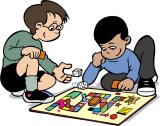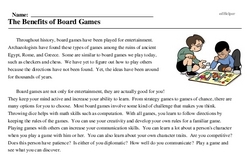The Benefits of Board Games
National Games and Puzzles Week
Reading Comprehension for November 21
Throughout history, board games have been played for entertainment. Archaeologists have found these types of games among the ruins of ancient Egypt, Rome, and Greece. Some are similar to board games we play today, such as checkers and chess. We have yet to figure out how to play others because the directions have not been found. Yet, the ideas have been around for thousands of years.
Board games are not only for entertainment, they are actually good for you! They keep your mind active and increase your ability to learn. From strategy games to games of chance, there are many options for you to choose. Most board games involve some kind of challenge that makes you think. Throwing dice helps with math skills such as computation. With all games, you learn to follow directions by keeping the rules of the games. You can use your creativity and develop your own rules for a familiar game. Playing games with others can increase your communication skills. You can learn a lot about a person's character when you play a game with him or her. You can also learn about your own character traits. Are you competitive? Does this person have patience? Is either of you diplomatic? How well do you communicate? Play a game and see what you can discover.
What is your favorite board game? In America, board games have been a popular pastime for many years. During the eighteenth and nineteenth centuries, board games became popular gifts for parents to buy for their children. Most of these games were chosen for the educational value. As time went on, board games increased in popularity. Games like Monopoly, Risk, and Clue came on the market. Following World War II, disposable income increased, and people were able to purchase games more easily. As the popularity of board games increased, so did the number of available games. Games were developed to help younger kids build reading, math, and motor skills. Games for older kids were invented to strengthen problem-solving skills. Today, there are games for every age and interest.




